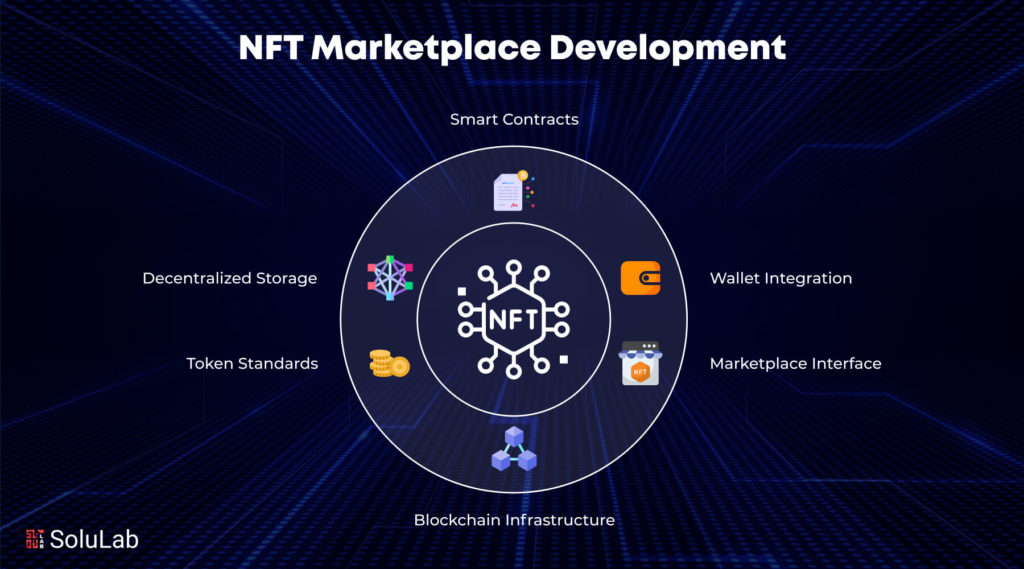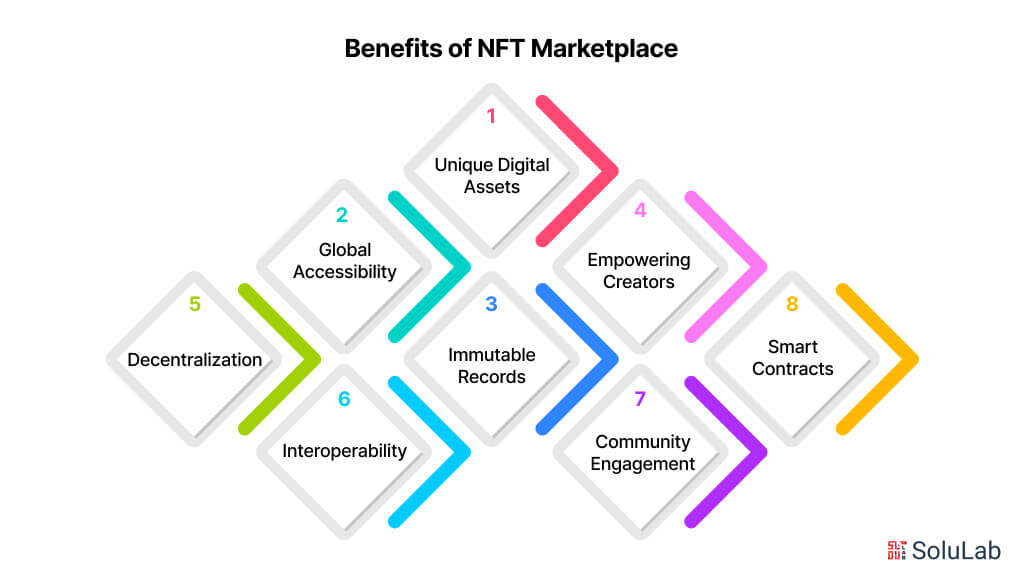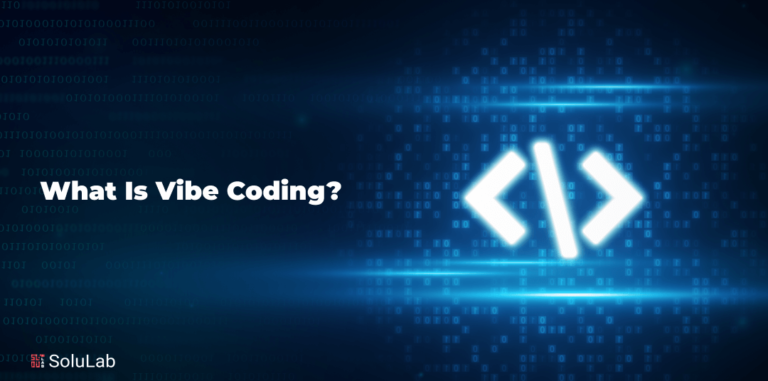
The world of art and collectibles observed a remarkable increase in the popularity of non-fungible tokens (NFTs). A study by Statista predicts the global NFT market development size will reach $2,378 million by 2024. With an anticipated annual growth rate (CAGR 2024-2028) of 9.10%, the total revenue could potentially soar up to $3,369 million by 2028.
These impressive growth projections encourage businesses to venture into the NFT space, leading to an increased interest in NFT marketplace development. For those considering building their own NFT marketplace, understanding the complete process is crucial. Let’s explore the steps involved in NFT marketplace development and delve into some of its significant advantages.
What is an NFT in Crypto?
Non-fungible tokens (NFTs) are digital assets that serve as proof of ownership for unique items or content, such as videos, music, and tweets, through the use of blockchain technology. Unlike cryptocurrencies like Ethereum and Bitcoin, which are exchangeable and fungible, NFTs are distinct and cannot be directly exchanged for each other.
A fundamental characteristic of NFTs is their uniqueness, making them impossible to replicate. This scarcity contributes to their value among collectors. Creators can leverage NFTs as a novel way to monetize their work, while buyers gain the opportunity to own and collect unique digital assets.
In summary, NFTs represent a transformative approach to ownership and value creation in the digital world, providing creators means of monetization and offering collectors a chance to acquire and appreciate one-of-a-kind digital assets.
What is an NFT Marketplace?
NFT marketplaces are digital platforms that enable users to buy and sell unique digital assets known as non-fungible tokens (NFTs). NFTs are not interchangeable and have varying values. Each NFT represents a distinct item, such as virtual real estate, collectible items, digital art, or even tweets. Stored on the Blockchain, these assets offer secure and tamper-proof ownership records and limited availability. NFT marketplaces empower creators to monetize their digital creations without relying on traditional intermediaries. Buyers gain exclusive ownership of digital assets, accompanied by proof of ownership and authenticity recorded on the Blockchain. Popular NFT marketplaces include Foundation, Rarible, and OpenSea, among others.
NFT Marketplace Architecture – How Does it Work?
Within the decentralized framework of NFT marketplaces, users can engage in secure and transparent transactions for various unique digital assets. The architecture leverages Blockchain technology, predominantly Ethereum, and progressively incorporates other Blockchain networks.
NFT marketplace app development architecture encompasses a multitude of elements that synergistically create an ecosystem. This ecosystem caters to a diverse range of participants, including collectors, creators, and innovators who actively contribute to the digital asset economy.
1. Smart Contracts
Within NFT marketplaces, smart contracts serve as digital agreements that operate autonomously based on pre-established rules codified in computer code. These contracts facilitate transparent and trustworthy transactions by overseeing the creation, ownership, and transfer of NFTs.
2. Blockchain Infrastructure
The blockchain serves as a transparent and immutable ledger of ownership, documenting each NFT transaction. Its primary application stems from its extensive adoption and inherent robustness, making it a reliable and widely accepted technology in the NFT ecosystem.
3. Wallet Integration
In NFT marketplaces, digital wallets emerge as a crucial component of the infrastructure. These wallets empower users to engage with NFT marketplaces seamlessly, providing secure storage for their cryptographic keys and facilitating secure trading of Non-Fungible Tokens (NFTs).
4. Marketplace Interface
Through its intuitive interface, users can effortlessly explore, acquire, and trade NFTs. The platform showcases detailed auction information, organized NFT collections, transaction records, and an array of additional features.
5. Token Standards
Token standards encompass the creation process of NFTs, outlining the management protocols on the Blockchain, and guaranteeing seamless interoperability between various platforms.
6. Decentralized Storage
By integrating NFT marketplace app development with decentralized storage solutions, users can enjoy the benefits of enhanced availability and robust security for their digital assets.
Traditional Marketplace vs NFT Marketplace
In the traditional marketplace, tangible goods and services are traded for currency, establishing ownership and value. However, NFTs (Non-Fungible Tokens) challenge this by representing unique tokens on the blockchain, conferring ownership rights to digital or physical assets. Let’s explore the key differences between the conventional marketplace and the NFT ecosystem:
1. Traditional Marketplaces:
- Traditional marketplaces exist physically, allowing for direct interaction between buyers and sellers.
- They offer a range of traditional goods and services.
- Traditional marketplaces foster interpersonal connections through face-to-face interactions, enabling consumers to examine products firsthand.
- Operating with an established model, traditional marketplaces instill deep-rooted customer trust.
- Transactions in traditional marketplaces involve the exchange of currency for physical items.
2. NFT Marketplaces:
- NFT marketplaces are digital platforms operating online, facilitating transactions through various internet platforms.
- They deal with digital assets such as music, art, virtual real estate, and more.
- NFT marketplaces use Blockchain technology to authenticate ownership and maintain digital scarcity.
- As an emerging model, NFT marketplaces are characterized by rapidly evolving standards and best practices.
- Transactions in NFT marketplaces involve the exchange of cryptocurrencies for digital assets.
Benefits of NFT Marketplace

The rapid expansion of NFT technology can be attributed to the numerous advantages offered by NFT marketplaces. Here are some of the most notable benefits of NFT marketplaces:
1. Unique Digital Assets
Non-fungible tokens (NFTs) represent complete ownership of various distinctive digital assets, including digital art, collectibles, domain names, and even virtual real estate. NFTs stand out from cryptocurrencies due to their unique characteristics, ensuring the scarcity and authenticity of digital creations.
2. Global Accessibility
The NFT marketplace app development transcends geographical boundaries, enabling users worldwide to engage in seamless cross-border trading. Regardless of your location, this platform empowers you to buy and sell NFTs, the concept of marketplaces, and create a truly borderless ecosystem.
3. Decentralization
One significant advantage of the NFT marketplace platform development lies in its operation within a decentralized Blockchain network. This eliminates the involvement of intermediaries such as auction houses or galleries, fostering a more transparent, secure, and censorship-resistant environment. Moreover, it empowers users with direct control over their digital assets.
4. Immutable Records
With every NFT transaction meticulously recorded on the blockchain, an unalterable and transparent ledger of ownership is established. This tamper-proof record serves as irrefutable evidence, guaranteeing the authenticity of digital assets. Furthermore, it effectively mitigates concerns surrounding counterfeiting and theft of artworks, offering unparalleled security and peace of mind.
5. Empowering Creators
Through the utilization of NFTs, creators have the ability to directly monetize their digital creations, empowering them to maintain greater control over their intellectual property rights. Additionally, artists can establish an ongoing revenue stream by automatically receiving royalties each time their NFT is resold, providing them with a sustainable source of income.
6. Interoperability
Within the NFT, standards such as ERC-721 and ERC-1155 serve as pivotal facilitators of interoperability across diverse platforms and ecosystems. This interoperability lays the groundwork for a comprehensive digital economy where NFTs engage seamlessly with decentralized applications (DApps), blockchain-based services, virtual worlds, and beyond. The seamless interaction between these entities paves the way for a robust digital environment.
7. Community Engagement
The vitality of the NFT marketplace development services is fueled by substantial community engagement, nurturing vibrant communities of collectors, artists, and enthusiasts. These platforms feature an array of social functionalities, such as virtual events, chatrooms, and forums. This fosters collaboration and interaction within the comprehensive NFT ecosystem, enhancing the overall experience for all participants.
8. Smart Contracts
In blockchain technology, smart contracts shine as self-executing agreements that eliminate the need for intermediaries. They possess the remarkable ability to automate the fulfillment of predetermined terms, enabling seamless execution. This ingenious concept introduces a heightened level of security to transactions, effectively minimizing the likelihood of disputes and fraudulent activities.
Must-Have Features in an NFT Marketplace
To cater to the diverse needs of users and ensure smooth and successful transactions, an NFT marketplace should be equipped with a range of essential features. In this article, we will explore some of the must-have features that can enhance the effectiveness and functionality of an NFT marketplace.
-
User-Friendly Interface
To ensure the success of an NFT marketplace, a user-friendly interface is crucial. An intuitive and uncluttered design should be employed to enhance the user’s experience and facilitate seamless navigation.
Furthermore, the marketplace should feature an engaging layout complemented by streamlined browsing capabilities and easily accessible search filters. By incorporating these elements, a positive and interactive experience with the platform can be guaranteed.
-
Robust Search and Discovery Tools
For an NFT marketplace development services to effectively cater to users’ interests, search functionality is paramount. Incorporate advanced filtering options alongside search to enhance the user experience in your marketplace. These filtering options should encompass categories such as artists, genres, and collections, enabling collectors to effortlessly explore the diverse range of NFTs available on the platform.
-
Secure Wallet Integration
In the digital marketplace, security is paramount, particularly when dealing with valuable assets such as NFTs. To guarantee the safety of your NFTs, it is crucial to integrate with a highly secure cryptocurrency wallet that provides robust storage and transfer mechanisms, especially during transactions.
To further enhance security, multi-factor authentication and encryption protocols should be implemented. These additional layers of protection add an extra level of defense, making it challenging for unauthorized individuals to access or manipulate your NFTs.
-
Compatibility with Various Blockchains
To cater to users with various preferences, the NFT marketplace can support multiple Blockchain networks, maximizing its reach. However, it’s crucial to ensure compatibility between the NFT market development and Blockchains to facilitate smooth token transactions while meeting the diverse needs of the community.
-
Gas Fee Optimization
When it comes to Blockchain transactions, gas fees play a crucial role in determining the cost-effectiveness of buying and selling NFTs. To mitigate these fees and make the marketplace more financially appealing and accessible, implementing a strategy for optimizing gas fees becomes essential. One effective approach involves employing layer 2 scaling solutions or batch processing, which can significantly reduce transaction costs for users. By optimizing gas fees, the marketplace can attract more participants and enhance its overall efficiency and sustainability.
-
Comprehensive Authentication and Verification Processes
To establish a dependable NFT marketplace platform development, a comprehensive authentication and verification system is imperative. The reliability of the marketplace hinges on robust authentication and verification processes.
Implementing a combination of measures is crucial, such as digital signatures, creator verification, and certification from reputable authorities. These measures are pivotal in maintaining the platform’s security and credibility.
Ensuring the integrity of the marketplace requires meticulous attention to detail and a commitment to maintaining the highest standards of authentication and verification.
-
Flexible Listing and Auction Options
To ensure creators have the flexibility to establish a comprehensive list of their NFTs, listing is crucial. Creators can develop selling strategies that align with their preferences through this method.
To accommodate various needs and entice a wide range of offerings to the marketplace, the marketplace should provide fixed-price listings, auctions, and royalties for secondary sales.
-
Transparent Transaction History
For users to effectively track the trading activities of NFTs on the marketplace, a clear and transparent transaction history is crucial. This history should encompass comprehensive details, such as prices, transaction dates, fees, and information about all parties involved. By providing users with a thorough transaction log, the platform can establish trust and credibility, enhancing the overall user experience.
NFT Marketplace Development Process
The NFT marketplace development process involves a sequence of steps, each designed to accomplish specific tasks. To gain a clear understanding, let’s explore these steps in detail:
1. Market Research and Blockchain Selection
The initial phase of NFT marketplace development commences with thorough market research. This critical step empowers the development team to gain insights into user requirements, conduct competitive analysis, and discern emerging trends within the industry. Subsequently, the team proceeds to select the most suitable Blockchain platforms that align with the specific goals and objectives of the NFT marketplace.
2. Development Environment Setup and Smart Contract Development
In the next phase of development, the team establishes a development environment equipped with essential tools and libraries. They proceed to create smart contracts specifically designed for the creation and transfer of NFTs, adhering to standards such as RC-721 or ERC-1555. It’s crucial to ensure that these smart contracts are optimized for efficiency, security, and compliance with established norms.
3. User Interface Design and Backend Implementation
In the digital marketplace, designers craft user interfaces that are both visually appealing and intuitively functional. Their focus lies on creating a seamless and straightforward navigation experience for users.
Furthermore, these professionals implement backend functionalities that encompass asset management, user authentication, transaction processing, and more. They integrate features such as notifications, search functions, and filters, which play a pivotal role in enhancing user experience.
4. Payment Gateway Integration and Security Implementation
Integrating a payment gateway is a fundamental aspect of building an NFT market development. It facilitates smooth transactions, enabling both fiat currency and cryptocurrency payments. To safeguard assets, user information, and financial operations, robust security measures should be implemented to mitigate threats like fraud and hacking.
5. Testing, Debugging, & Launch Preparation
During this phase, the newly created products undergo rigorous testing to uncover and address any bugs, security vulnerabilities, or technical hiccups. The development team systematically tests the products across a range of devices and simulated environments to ensure seamless performance and user satisfaction.
6. Market Launch & Initial Marketing
Upon successful testing, the development team embarks on the launching phase of the NFT marketplace development process. To entice users and creators, they launch the marketplace alongside a well-crafted marketing campaign. Press releases, influencer engagement, and utilization of NFT in social media platforms serve as effective tools to raise awareness and generate interest in the platform.
7. Community Engagement, Monitoring, and Updates
Engaging the community is a valuable strategy. Through social media, forums, and community events, you can interact with your audience, gather feedback, and address concerns. By analyzing user activity, platform performance, and market trends, you can make informed decisions about updates and improvements. This data-driven approach helps you focus on enhancements that align with your users’ needs and market demands.
NFT Marketplace Development Tools
In the creation of an NFT marketplace, a variety of tools and services are utilized, each with its own specialized function. To gain a deeper understanding, let’s explore some of the commonly employed NFT marketplace development tools:
-
Smart Contract Development Tools
Smart contracts are fundamental to the NFT marketplace development process, enabling the creation, transfer, and management of diverse digital assets. Solidity is a widely recognized tool for developing smart contracts on various Blockchain platforms, including Ethereum and Binance Smart Chain.
Truffle Suite, a highly acclaimed framework, simplifies the development process. It provides streamlined testing and deployment capabilities for smart contracts, enhancing reliability and efficiency.
-
Blockchain Platforms
When establishing an NFT marketplace, choosing the right Blockchain platform is crucial. Due to its support for the ERC-721 and ERC-1155 standards, Ethereum has emerged as a popular choice. (i.e., Ethereum, Binance Smart Chain).
Binance Smart Chain offers scalability and cost-effectiveness, making it a viable alternative for developers seeking a viable option to Ethereum.
-
Wallet SDKs
For seamless NFT engagement, integrating a wallet is crucial. MetaMask lets users administer Ethereum-based assets and interact with decentralized apps (DApps). WalletConnect offers secure communication channels between mobile wallet apps and DApps, enhancing accessibility across diverse platforms like MetaMask and WalletConnect.
-
IPFS for decentralized storage of NFT metadata
IFPS (InterPlanetary File System), being a decentralized storage solution for NFT metadata, provides accessibility and immutability without the need for a centralized server. By distributing files across a network of nodes, IFPS enhances data integrity and mitigates censorship risks. It ensures that NFT metadata remains available and tamper-proof, empowering artists and collectors to preserve the authenticity and integrity of their digital creations.
-
Frontend Frameworks
In NFT applications, developers leverage frontend frameworks like Angular and React to create intuitive user interfaces. These frameworks not only offer scalability and robust architectures but also boast a thriving ecosystem of diverse tools and libraries. This seamless integration empowers developers to incorporate various features such as bidding, asset browsing, collection management, and more, resulting in enhanced user experiences. (Examples: React, Angular)
-
Security Auditing Services for smart contracts
To minimize potential vulnerabilities and enable seamless platform integration, a comprehensive security audit is crucial. Certain services, such as OpenZeppelin and CertiK, excel in identifying and auditing smart contracts. Through code analysis and testing, these services effectively address various security flaws. (e.g., OpenZeppelin, CertiK)
-
Payment Gateways and Integration APIs
In NFT marketplace platform development, seamless transactions rely on effective payment gateway and API integration. Platforms like Stripe and Coinbase Commerce offer robust payment processing solutions. They facilitate the conversion of fiat currencies into cryptocurrencies, enhancing the user experience. (e.g., Stripe, Coinbase Commerce)
How Much Does it Cost to Build an NFT Marketplace?
Developing a basic NFT marketplace application with simple features and functionalities typically costs between $20,000 and $60,000. On the other hand, developing a complex NFT marketplace application with advanced features and functionalities can cost significantly more, ranging from $100,000 to $500,000. The cost of building an NFT marketplace is influenced by various factors such as design, features, complexity, development time, ongoing maintenance, marketing expenses, and more.
Conclusion
In conclusion, the NFT marketplace development process in 2025 is pivotal for anyone looking to tap into the burgeoning world of digital assets. Understanding what is an NFT and the intricacies of NFT marketplaces is the first step toward creating a successful platform. The NFT marketplace development journey involves multiple stages, from ideation and planning to execution and deployment, each critical for building a robust NFT marketplace platform.
Engaging in NFT marketplace app development ensures that your platform is accessible and user-friendly, catering to the growing demand for mobile solutions. Partnering with specialized NFT marketplace developers can streamline the nft-marketplace-development process, ensuring a seamless integration of features and functionalities tailored to your needs.
Whether you’re exploring NFT market development for the first time or looking to enhance your existing platform, investing in a comprehensive NFT marketplace development services will provide the expertise and support needed to succeed. As the NFT continues to expand, staying ahead with NFT marketplace platform development is essential. SoluLab is your trusted partner in navigating this exciting journey, offering unparalleled expertise solutions for your NFT marketplace development needs.
FAQs
1. What is an NFT?
An NFT, or Non-Fungible Token, is a unique digital asset that represents ownership or proof of authenticity of a specific item, such as art, music, or collectibles, on a blockchain.
2. What is the NFT marketplace development process?
The NFT marketplace development process involves several stages, including planning, designing, developing, testing, and deploying a platform where users can buy, sell, and trade NFTs.
3. What are the key steps in NFT marketplace development?
Key steps in NFT marketplace development include defining the platform’s features, choosing the blockchain technology, designing the user interface, developing smart contracts, and integrating payment gateways.
4. Why should I consider NFT marketplace app development?
NFT marketplace app development ensures that your platform is accessible on mobile devices, providing users with a convenient and seamless experience for trading NFTs on the go.
5. What is involved in NFT marketplace platform development?
NFT marketplace platform development involves creating a scalable and secure platform that supports various NFT transactions, user management, and seamless integration with blockchain networks.
6. What benefits do NFT marketplace development services offer?
NFT marketplace development services provide expertise in creating customized platforms, ensuring security, compliance with regulations, and delivering a user-friendly interface tailored to your specific needs.
7. How do I choose the right NFT marketplace developers?
Choosing the right NFT marketplace developers involves looking for experienced professionals with a strong portfolio in blockchain technology, smart contract development, and user-centric design to ensure a successful project.
8. What are the advantages of NFT marketplaces?
NFT marketplaces offer a decentralized platform for creators and collectors to trade unique digital assets, providing transparency, security, and ownership verification through blockchain technology.
9. What factors should be considered in NFT market development?
In NFT market development, consider factors such as user experience, security features, scalability, blockchain integration, and compliance with legal and regulatory requirements.
10. How can an NFT platform benefit my business?
An NFT platform can benefit your business by opening new revenue streams, enhancing brand visibility, and offering unique digital assets to engage with a global audience.






